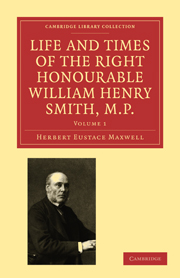Book contents
- Frontmatter
- PREFACE
- Contents
- ILLUSTRATIONS TO THE FIEST VOLUME
- LIFE AND TIMES OF THE RIGHT HON. W. H. SMITH
- CHAPTER I 1784–1846
- CHAPTER II 1846–1854
- CHAPTER III 1854–1893
- CHAPTER IV 1855–1865
- CHAPTER V 1865–1868
- CHAPTER VI 1868–1869
- CHAPTER VII 1870–1871
- CHAPTER VIII 1872
- CHAPTER IX 1873-1874
- CHAPTER X 1874-1876
- CHAPTER XI 1876-1878
- CHAPTER XII 1878
- Plate Section
CHAPTER I - 1784–1846
Published online by Cambridge University Press: 29 August 2010
- Frontmatter
- PREFACE
- Contents
- ILLUSTRATIONS TO THE FIEST VOLUME
- LIFE AND TIMES OF THE RIGHT HON. W. H. SMITH
- CHAPTER I 1784–1846
- CHAPTER II 1846–1854
- CHAPTER III 1854–1893
- CHAPTER IV 1855–1865
- CHAPTER V 1865–1868
- CHAPTER VI 1868–1869
- CHAPTER VII 1870–1871
- CHAPTER VIII 1872
- CHAPTER IX 1873-1874
- CHAPTER X 1874-1876
- CHAPTER XI 1876-1878
- CHAPTER XII 1878
- Plate Section
Summary
Not very long before the following pages began to be penned, Sir Charles Bowen commented with caustic good humour on what he termed the growing tendency of the age to write ponderous biographies of Nobody.
It must always be a matter of opinion to what exact degree of eminence a man should rise above the mean level of character, or what store of achievement it should be possible to lay to his account, before the public are invited to the perusal of his biography.
“Oh! vain attempt to give a deathless lot
To names ignoble, born to be forgot.”
There is an ominous sentence in one of Horace Walpole's letters: “One can never talk very long about folks that are merely excellent—I mean, unless they do not deserve it, and then their flatterers can hold forth upon their virtues by the hour.” The affection of his family — the predilection of his friends—the gratitude of those whom he may have benefited—the admiration of humbler men from among whom he may have raised himself—the success with which Fortune, so partial in her favours, so indifferent to merit, may have filled his sails,—all these have to be liberally discounted before the figure of a public man can be viewed in the just perspective essential to critical narrative.
- Type
- Chapter
- Information
- Publisher: Cambridge University PressPrint publication year: 2010First published in: 1893

